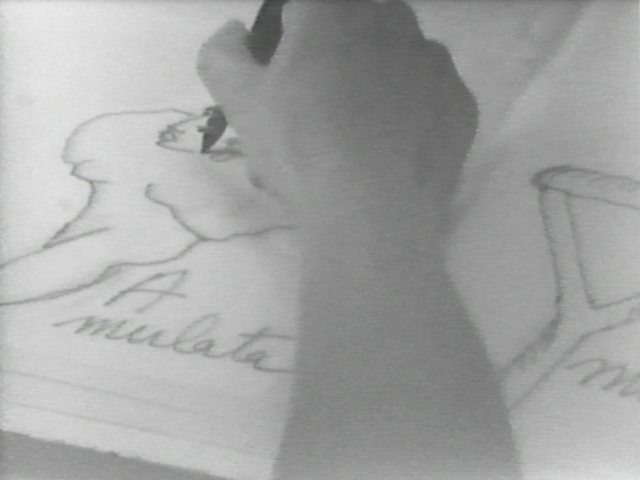Anna Bella Geiger: Screening and Conversation
EAI is honored to present a special evening with artist Anna Bella Geiger. For over sixty years, Geiger has been an influential artist in Brazil and beyond. Her impact derives from her multidisciplinary body of work, her pioneering deployment of video, her social and political activism and her ever-growing legion of students. Geiger, who lives in Rio de Janeiro, will screen and discuss her newly preserved video works from the 1970s and debut a short film portrait, created in conjunction with her participation in the Brazilian Film and Video Preservation Project. Following the screening, curator Barbara London will lead a Q&A with the artist.
The Brazilian Film and Video Preservation Project, and this event, are sponsored by the Ostrovsky Family Fund.

|
Thursday, April 25th, 2019 6:30 pm Electronic Arts Intermix (EAI) 535 West 22nd Street, 5th Fl. New York, NY 10011 www.eai.org Free admission RSVP |
In her multidisciplinary artwork, which includes painting, sculpture, photography, collage, engraving, film, video and multimedia installation, Geiger interweaves the political and the poetic to address issues of identity, national culture and cultural stereotypes. Geiger is recognized as among the first video artists in Brazil; she began to work with the medium in 1974. Her groundbreaking body of early conceptual performance videos maps the relationship between the (often female) body, space, and place, in what the artist has termed an “anthropo-morphic cartography.” Maps and geography, as metaphor and material, play an important role in her work, as do language and linguistics. Moving from abstraction in the 1950s to organic forms that suggest the body in what is termed her “visceral phase” in the 1960s, Geiger engaged in sociopolitical activism in response to Brazil’s military dictatorship at the end of that decade. In addition to her influential artistic practice, Geiger is also well-known as an educator; she began teaching at Columbia University in New York in 1969 and is currently a professor at the Escolade Artes Visuals do Parque Lage in Rio de Janeiro.
Image: Mapas elementares nº 3, Anna Bella Geiger, 1976
___________________________________
Born in 1933 in Rio de Janeiro, Brazil, Anna Bella Geiger began her formal education in literature and language at the Federal University of Rio de Janeiro. Moving to New York in the 1950s, she attended classes in history and sociology of art at the Metropolitan Museum of Art and New York University. Her work has been exhibited at numerous institutions including Brooklyn Museum (New York); The Museum of Modern Art (New York); Fondation Cartier pour l’art contemporain and Centre Pompidou (Paris); J. Paul Getty Museum (Los Angeles); Fogg Museum at Harvard (Cambridge, Massachusetts); Victoria and Albert Museum (London) and Tate Gallery (London); Spain’s Museo Centro de Arte Reina Sofía (Madrid); Museu d’Art Contemporani de Barcelona and Centro Galego de Arte Contemporáneo (Santiago de Compostela); Museu de Arte Contemporânea de São Paulo; Mendes Wood DM Gallery (Brussels & São Paulo); and 39th Venice Biennale (Venice).
Geiger has received a fellowship from the John Simon Guggenheim Memorial Foundation, and has been awarded Bolsa Vitae de Artes Plásticas (2010), Prêmio SESC Rio de Fomento à Cultura (2010) and Prêmio IBRAM de Artes Visuais (2011) in Brazil. In 1987, Geiger co-authored the book Abstracionismo Geometrico e Informal: a vanguard brasileira nos anos cinquenta with Fernando Cocchiarale; she is the subject of two retrospective catalogs, Anna Bella Geiger: territórios, passagens, situações (2007) and Anna Bella Geiger: passagens conceituais (2008).
___________________________________
The Brazilian Film and Video Preservation Project (BFVPP) is dedicated to the conservation and contextualization of film and video works of Brazilian women artists. BFVPP seeks to draw attention to this work and the stories behind it, to celebrate the artists and enable them to preserve their achievements for themselves and for posterity, and to study and archive this important part of art history. Anna Bella Geiger is the project’s first subject.
Project goals include restoring and preserving early film and video, remastering these works for the artists and posterity, and assuring they are maintained in Brazilian and international archives. BFVPP also cooperates with institutions, offering technological upgrades to replace extant versions. This initiative explores these works in the context and timeframe in which they were created via scholarly research, reexamining their place within the history of early film and video. In addition, BFVPP will shoot original footage of the artists reflecting on how video fit within their practice, the challenges of that era and early moving image work, and the artists' impressions about moving image art today.
___________________________________
About EAI
Electronic Arts Intermix (EAI) is a nonprofit arts organization that fosters the creation, exhibition, distribution, and preservation of moving image art. A New York-based international resource for media art and artists, EAI holds a major collection of over 3,500 new and historical media artworks, from groundbreaking early video by pioneering figures of the 1960s to new digital projects by today’s emerging artists. EAI works closely with artists, museums, schools and other venues worldwide to preserve and provide access to this significant archive. EAI services also include viewing access, educational initiatives, extensive online resources, technical facilities, and public programs such as artists’ talks, screenings, and multi-media performances. EAI’s Online Catalogue is a comprehensive resource on the artists and works in the EAI collection, and features expansive materials on media art’s histories and current practices:
www.eai.org
___________________________________
Electronic Arts Intermix
535 West 22nd Street, 5th Floor
New York, NY 10011
t (212) 337-0680
f (212) 337-0679
___________________________________
This program is made possible in part by public funds from the New York City Department of Cultural Affairs, in partnership with the City Council; and New York State Council on the Arts with the support of Governor Andrew M. Cuomo and the New York State Legislature.







